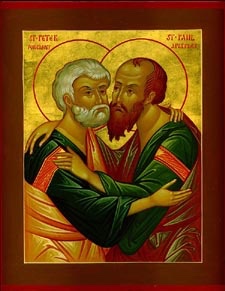The Cephas connection is curious and a lot of ink has been spilled over how to interpret the Greek, trying to pull upon the different shades of meaning that exist between "petros" and "petra," as well as conjecture over how Aramaic has "only one word for rock."
My theory on the matter explains both the Greek distinction as well as the potential words that Jesus spoke in his native dialect. But it's a bit tricky to explain, so bear with me.
It is true that in most dialects of Aramaic (especially Eastern dialects – the most prolific) there is only one main word for "rock" in the common sense, and that is generally the word כיף /kef/ (in the Emphatic כיפא /kefa/ or /kifa/). This is certainly the monicker given to Simon, and where the Greek transliteration κεφας comes from. It meant "rock" or "stone" of any size or shape, or as a building material.
However, there
is an auxiliary word for "rock" or "stone" which is אבן /aven/ or /even/ which is shared in common with Hebrew, and was used as "stone" as in the material in earlier Jewish material (such as in Ezra 6:4) but in most
contemporary dialects to Jesus this took on the connotation of "gemstone" (whether precious or semiprecious).
In Western Aramaic dialects (such as Jesus' own Galilean and others that were more Western-leaning like Nabatean), its meaning didn't fully specialize, and its use as "gem" was generally qualified with the adjective טב /tav/ (or "good") or when in the plural in the context of treasure, of which we have plenty of examples.
Otherwise, it too was used like כיף as "rock" or "stone" of any size or as the building material.
But here's the fun thing about אבן – given the way it's inflected, it can become a clever pun with the verb בני /bny/ or "to build" which we see Jesus use in the very next portion of the verse. To illustrate, let's look at what was stated like this:
You are כיפה /kefa/ (Cephas,rock,stone) and on this אבנה /avna/ (rock,stone) אבני /evne/ ("I will build") my church.
In older orthography, the final "e" of אבני /evne/ could have even been written with a ה making it orthographically indistinguishable from אבנה /avna/ in Galilean spelling.
So there is this progression from rock, to another name for a rock, to a pun on the words rock and build. And because of the two different words used for "rock" it solves the problem of the Greek using petros first, followed by petra, if we assume it's an attempt at keeping a translational distinction (albeit for two words that are, for all intents, synonyms).

Or at least that's my theory.
In either case, trying to make an argument for or against Papal authority on a passage such as this based upon Greek etymology and shades of Greek meaning is a bit treacherous.

